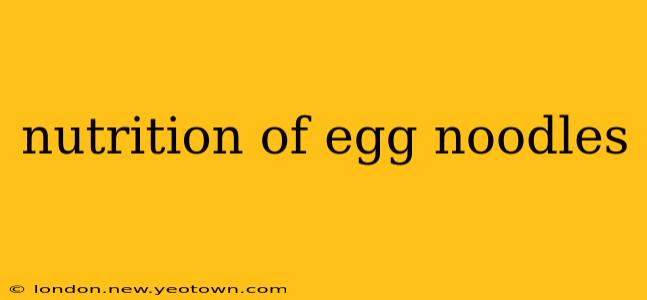Egg noodles, those delightfully chewy strands that grace countless cuisines, are more than just a culinary staple. They offer a surprising nutritional profile, making them a versatile addition to a balanced diet. But just how nutritious are they, really? Let's dive into the details, exploring the nutritional content, benefits, and potential drawbacks of this beloved pasta.
What is the nutritional value of egg noodles?
The nutritional makeup of egg noodles varies slightly depending on the ingredients and preparation method. However, a typical serving (around 100g or about a cup cooked) generally provides:
- Carbohydrates: Egg noodles are primarily carbohydrates, providing energy for your body. This is their main source of calories.
- Protein: The addition of eggs contributes to the protein content, making egg noodles slightly more protein-rich than their all-wheat counterparts.
- Fat: The fat content is usually modest, especially if you avoid adding butter or oil during cooking.
- Vitamins and Minerals: Egg noodles offer small amounts of various vitamins and minerals, including some B vitamins and iron, though not in significant quantities.
It's important to note that enriched egg noodles often contain added vitamins and minerals to boost their nutritional profile. Always check the nutrition label on your specific brand for precise details.
Are egg noodles healthy?
The healthfulness of egg noodles, like most foods, hinges on moderation and context. In moderation, egg noodles can be part of a healthy diet. Their carbohydrate content provides energy, and the protein from the eggs offers some satiety. However, they are not a nutritional powerhouse in and of themselves. Overconsumption can contribute to weight gain due to their carbohydrate content.
How many calories are in egg noodles?
The calorie count in egg noodles varies depending on the serving size and the specific brand, but a typical serving of cooked egg noodles (around 100g) contains approximately 150-200 calories. Adding sauces, oils, or butter will significantly increase the calorie count.
Are egg noodles good for weight loss?
Egg noodles themselves aren't inherently bad for weight loss, but they shouldn't be the cornerstone of a weight-loss diet. Because of their carbohydrate content, it's crucial to consume them in moderation as part of a balanced, calorie-controlled eating plan. Focus on portion control and pairing them with plenty of vegetables and lean protein sources to create a more complete and satisfying meal.
What are the benefits of egg noodles?
While not a superfood, egg noodles offer some benefits:
- Energy Source: The carbohydrates provide readily available energy.
- Moderate Protein: The added egg provides a modest protein boost compared to other pasta types.
- Versatility: Egg noodles are incredibly versatile and can be incorporated into countless dishes, allowing for creative meal planning.
What are the downsides of eating egg noodles?
Like any food, there are potential downsides to consider:
- Refined Carbohydrates: Many commercially produced egg noodles are made from refined flour, lacking the fiber found in whole wheat pasta. This can lead to blood sugar spikes and energy crashes.
- Low in Fiber: The relatively low fiber content may not contribute to optimal digestive health.
- Potential Allergens: Individuals with egg allergies should avoid egg noodles.
How to make egg noodles healthier?
There are ways to make egg noodles a healthier choice:
- Choose whole wheat options: Look for egg noodles made with whole wheat flour for added fiber and nutrients.
- Control portion sizes: Be mindful of serving sizes to manage calorie intake.
- Pair with healthy additions: Include plenty of vegetables and lean protein in meals containing egg noodles for a more balanced nutritional profile.
- Limit added fats: Avoid excessive butter, oil, or creamy sauces.
In conclusion, egg noodles can be a delicious and enjoyable part of a balanced diet when consumed mindfully. By choosing whole wheat options, controlling portions, and incorporating them into nutrient-rich meals, you can enjoy their culinary versatility without compromising your health goals. Remember to always check the nutrition label for specific details about the ingredients and nutritional information of your chosen brand.

